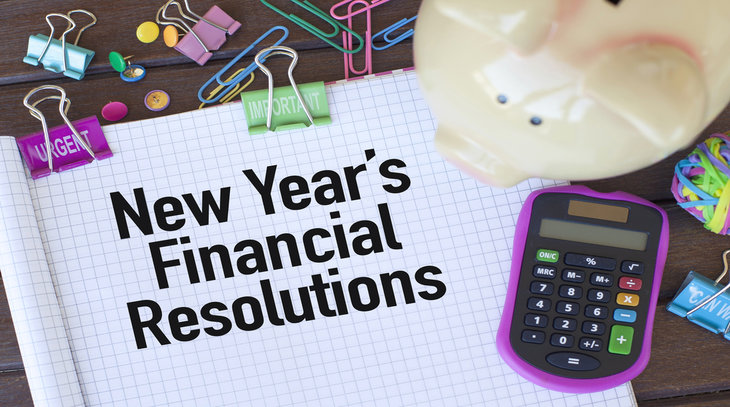Happy New Year! It’s 2017 and with the dawn of a new year comes numerous opportunities, including overhauling your financial life for the better. An excellent place to start is by making good Financial Resolutions that can help get you closer to living the life you desire.
Victoria Mutual was established as an organisation committed to helping individuals from all walks of life realise their goals. Today, against this rich heritage, we remain committed to empowering our Members globally to acquire their own homes and achieve their financial independence. This commitment to empowering individuals to achieve their goals is not only for our Members and clients but also for YOU! There are many resources within the Group to help you buy that 3-bedroom home, pay for your children’s education, take that much-needed vacation, or achieve your specific financial resolutions this year.
Before you start making your resolutions, here are a couple of things we want you to keep in mind.
Be Specific & Realistic
One of the main reasons people often fail to keep their resolutions is because they’re too vague, aggressive or rigid. For example, if you resolve to save $50,000 towards retirement this year but don’t identify where the funds are going to come from, you are very likely to fail.
Here’s what we suggest – identify the reason you’re making the resolution and write that down. Perhaps you desire creating a secure financial future for yourself or to provide for your family. Now let’s dig a little deeper by asking some questions. For example, what needs to happen for you to save that $50,000 this year? Do you need to start taking public transportation to work a couple times per week? Is an automatic salary deduction the best way to ensure you save the necessary amount each month? Will eating out only twice a week instead of three make a significant difference?
In sum, don’t just make a resolution without first considering your current lifestyle. Check whether your goals are realistic based on your current position – debts outstanding, monthly earnings, monthly expenses and so on – as it may be difficult for you to save a significant amount if, for instance, a monetary work benefit will be discontinued. Also, don’t be afraid to adjust your goals throughout the year, as your situation changes.
Very importantly, review your resolutions at regular intervals and track your progress, so they stay fresh in your mind and help you to stay on track.
Seek Support to Stay Accountable
It can be difficult to keep resolutions since you’re making a change from your norm, but there is strength in numbers! To give yourself every opportunity to succeed, share your resolutions with a ‘resolution partner’ and seek their support throughout the year to help you remain on track. This might be a spouse, friend, financial planner or other trusted person with whom you can share your resolutions.
Sharing the resolution will help solidify it in your mind, motivate you and keep you accountable. Knowing your buddy is there to hear you out, recognise your progress, scold you if you go off track, and encourage you to move forward can be instrumental to your success.
Have a scheduled meeting, maybe over coffee or pizza, and evaluate your cash flow, investment performance and resolutions. These sessions will help you take an honest look at your progress, keep you well-informed about where your money is going, and provide insight into how you can improve your financial situation.
And because it’s the age of technology, why not use an app to help keep you accountable, too? There are various apps available online, such as Mint and BillMinder, which will do the job, some at no cost to you.
Now for the good stuff. We all have specific financial goals we want to achieve, but some goals are a bit, let’s say, universal.
Here are some resolutions we suggest that you add to your list for 2017, to ensure you achieve Financial Independence.

- Create an Emergency Fund
Would you be able to survive for the next six months if you were to become unemployed today? An Emergency Fund is enough money to cover six months to a year of living expenses, in the event you (or your spouse) become unemployed or have an emergency. Having an Emergency Fund means you will be covered when an emergency happens. There should be no need to take out a loan, possibly at high interest, to pay for your emergency. In addition, the peace of mind which comes with knowing you are prepared for an eventuality is priceless.
![]()
- Get Rid of High-Interest Debts
While some debt is necessary, not all debt is equal. Take some time to make a list of all your liabilities. Next, organise them based on their interest rates. Those with the highest rates, such as pay-day loans and credit card debt, should be paid off immediately. After all, isn’t it counter-productive to be investing money on the one hand, while you are paying the high-interest debt at the same time?
![]()
- Improve Your Financial Knowledge
Knowledge is power. But how sound is your financial know-how? For instance, do you know the difference between a stock and a bond? How about how much you spent last year on meals or movie tickets? Not to worry. Using personal finance software such as Microsoft Money can help you become more aware of what your financial footprint looks like. You can use this software to print a report on a quarterly basis, and review your income and expenditures for the period in question. You might be surprised at the amount of money you spend on small items such as your morning coffee!
If you want to learn to cook, you can watch cooking shows and read cookbooks, right? In the same way, be deliberate with your financial education – pick up a copy of The Intelligent Investor, read online articles or watch financial programs. You will learn about the financial market and the nature of money in general, and be able to apply this knowledge as you create your long-term wealth. The Victoria Mutual team also stands ready to help you improve your financial knowledge – so you can reach out to us as well.
![]()
- Maximise Your Income
While you resolve to change your diet, exercise more, and improve your financial health, wouldn’t you want to increase your earnings? Start by looking for opportunities to be promoted at work. Plus, get creative – if you are good at something most people aren’t, or if you can easily perform an activity most people would rather outsource, turn this into freelance work and watch those dollars roll in to increase your savings. Before you know it, you would’ve baked your way into your dream vacation.
![]()
- Focus on Your Physical Health
There is an obvious connection between physical, emotional and financial health. Money has been identified by experts as one of our biggest sources of stress. This emphasises how important it is to not only get your financial house in order but also exercising regularly and engaging in healthy practices, which will reduce healthcare costs, as you will feel better generally. Feeling better will lead you to make wiser financial decisions that will pay off in the long-term.
![]()
So whether you resolve to increase your savings, save towards an emergency fund or become a better investor, you’ll need more than good intentions to keep your financial resolutions. Above all, your resolutions need to be specific and realistic. And don’t be too hard on yourself – allow yourself some false starts and seek support from others to ensure you have every chance of success.
Let’s resolve to make 2017 a great year for your wallet!












